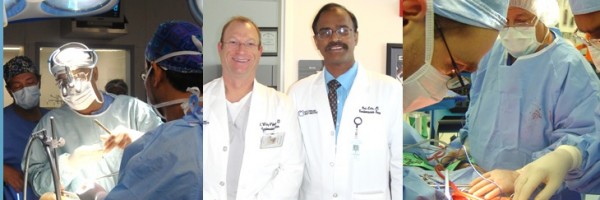| Our Bureau, Mumbai Monday, April 16, 2012, 14:25 Hrs [IST] |
|
Yashoda Hospital recently organized and conducted a live international workshop on minimal access cardiac surgery also called minimally invasive cardiac surgery (MISC) at its academic hall. The aim of the workshop was to discuss the latest advances and improved outcomes of MISC thus taking it to the next level. Standard procedures for heart surgery can be most invasive as they involve 10″-12″ incisions. An MICS procedure is often performed through a smaller 3″-5″ incision placed between the ribs, or can be done with few small incisions. During the workshop which was conducted on April 14 and 15 the focus was on advantages of MICS which includes minimum hospitalization, less cost, minimal blood loss, faster recovery, cosmetic advantage, lower infection rate and lesser post surgical complications. Nearly 150 eminent surgeons from all over India and two renowned international cardiac surgeons attended the workshop as faculty. The international faculty included Dr Hendrik Treede, senior consultant and head of minimally invasive surgery, University Heart Center Hamburg, Germany; and Dr Mahesh Ramachandani, director, minimally invasive cardiac surgery, methodist debakey heart and vascular centre, Houston, Texas, USA. Dr AGK Gokhale, head of the department, department of minimally invasive cardiac surgery (MICS) Yashoda Hospital, Secunderabad, who presided over the live workshop, facilitated smooth interactions between the audience and the faculty, contributing to the workshop’s success. Three cases of bypass surgery and valve replacements were performed by minimal access approach in this workshop. Dr Gokhale, drawing attention to the advantages of MICS informed that in an open-chest surgery, the heart and its vessels are exposed through median sternotomy, where the breastbone is sawed open down the mid line and then pulled apart. This is an extremely invasive and traumatic part of a standard heart surgery. In comparison, a minimally invasive procedure uses small incisions to access the heart without stopping the heart or cutting the breastbone and ribcage. A minimally invasive surgery causes lesser trauma and the recovery time is much shorter. “Additionally, this approach lowers risk of complications such as bleeding and infection. Upon returning home, many patients resume their normal lives in much less time. They require minimal assistance and report needing little or no pain medication. Often, they begin cardiac rehabilitation sooner and consistently maintain their regimen. In as little as two weeks, patients have resumed day-to-day activities and even returned to their jobs,” Dr Gokhale added. Dr G S Rao, managing director, Yashoda Group of Hospitals said, “Yashoda Heart Institute has earned the reputation of being a leader in heart care performing approximately 10,000 procedures annually. We have made great strides in cardiology and minimally invasive cardiothoracic surgery and thousands of cardiac procedures and surgeries were performed with precision and success. This live workshop will not only highlight the advantages but will also talk about taking this procedure to its next logical level.” |
 Ask Doctor
Ask Doctor
